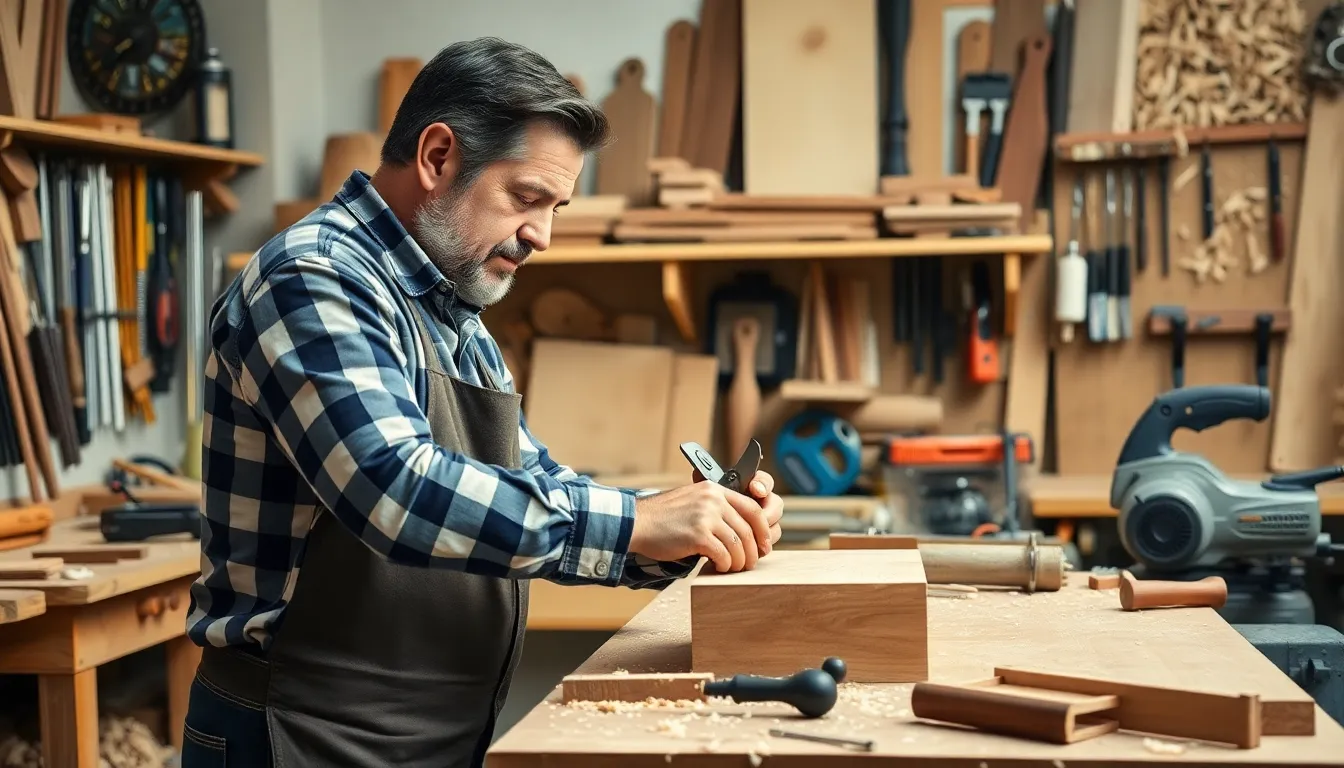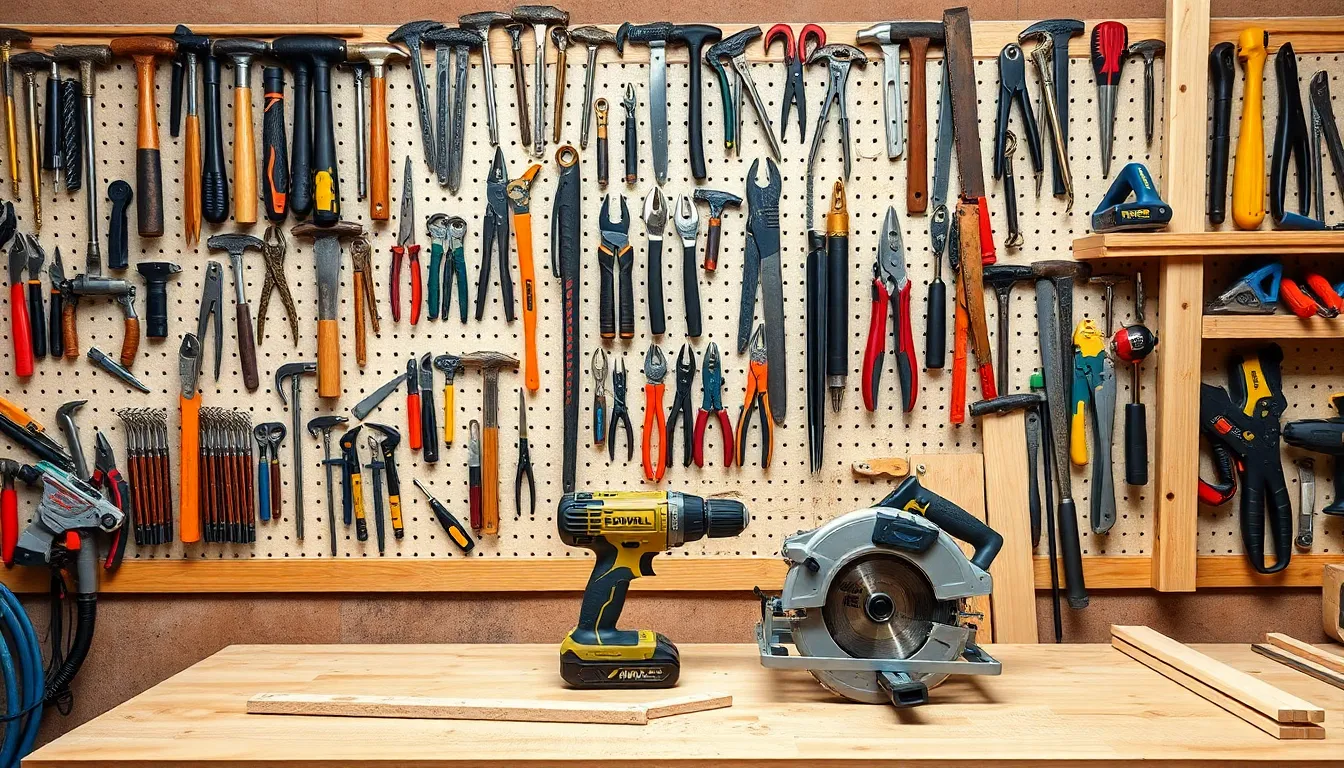Every DIY enthusiast knows that a well-equipped workshop is the secret sauce to turning visions into reality. Whether you’re a weekend warrior or a seasoned pro, having the right tools can mean the difference between a masterpiece and a Pinterest fail. Imagine trying to build a birdhouse with nothing but a butter knife—talk about a recipe for disaster!
Table of Contents
ToggleEssential Workshop Tools
A well-equipped workshop requires a selection of essential tools to facilitate various projects. These tools not only enhance efficiency but also improve the quality of workmanship.
Hand Tools
Hand tools remain fundamental in any workshop. Pliers create a firm grip on materials, making it easier to bend or cut wires. Screwdrivers come in various sizes and types, allowing for the secure fastening of screws. Wrenches aid in tightening nuts and bolts, ensuring sturdy connections. Measuring tapes provide accurate dimensions, crucial for precise cuts. Hammers assist in driving nails, making construction tasks much simpler. Leveling tools help achieve a straight and even surface on projects.
Power Tools
Power tools offer speed and precision that hand tools cannot match. Drills enable quick drilling of holes in various materials, enhancing efficiency. Saws, such as circular saws and jigsaws, cut through wood and other materials effortlessly. Sanders smooth surfaces, reducing prep time before finishing. Nail guns expedite fastening with ease and accuracy. Routers shape edges and hollow out areas in wood, adding a professional touch. Finally, compressors power pneumatic tools, providing versatility in workshop tasks.
Specialty Tools

Specialty tools enrich workshop capabilities, enabling more advanced projects. Different types focus on specific tasks in woodworking and metalworking.
Woodworking Tools
Woodworking requires unique tools for precision and skill. Chisels come in various sizes, allowing for fine detailing. Hand planes, essential for smoothing surfaces, help achieve a polished finish. Router bits provide versatility for shaping edges and creating decorative profiles. Jigsaws and band saws make intricate cuts effortlessly. Clamps stabilize materials, ensuring accuracy during assembly. Saws, such as table saws, function for larger projects and straight cuts. Together, these tools enhance craftsmanship, making woodworking rewarding and effective.
Metalworking Tools
Metalworking employs specialized tools tailored for working with metal. Angle grinders cut and shape metal materials efficiently. Welding machines facilitate sturdy connections, creating robust structures. Drill presses offer precision when boring holes through various metals. Bench vises securely hold workpieces in place, enhancing safety and stability. Torches enable cutting and joining metals, providing versatility in metal fabrication. Each tool serves a specific purpose, contributing to successful metalworking outcomes and projects.
Safety Equipment
Safety equipment plays a crucial role in a workshop. Items like safety goggles protect eyes from flying debris while cutting or sanding materials. Hearing protection shields ears from loud power tools, which can lead to long-term damage.
Gloves are vital for hand protection when handling sharp objects, rough surfaces, or chemicals. When working with heavy materials, sturdy steel-toed boots prevent foot injuries from dropped items.
Dust masks or respirators filter harmful particles, ensuring clean air while sanding or painting. A first aid kit provides essential supplies for treating minor injuries, emphasizing a proactive approach to safety.
Fire extinguishers should be readily available, especially when working with combustible materials. Reflective vests enhance visibility when working in low-light conditions or around vehicles.
Properly maintained safety gear enhances overall workshop safety. Workers must routinely check and replace worn-out equipment to maintain effectiveness. Additionally, labeling hazardous areas and materials increases awareness and reduces the risk of accidents.
Using safety equipment increases confidence while working and ensures enjoyable DIY experiences. Prioritizing safety empowers DIYers to focus on their projects without the fear of injury.
Maintenance and Care
Proper maintenance and care of workshop tools enhance longevity and performance. Regular cleaning prevents rust and ensures precision. For hand tools, wiping down surfaces with a cloth after each use removes moisture and grime. Inspecting tools for wear or damage is essential; any deteriorated parts should get replaced immediately.
Power tools also require attention. Dust and debris accumulate in motors and vents, so blowing them out with compressed air maintains efficient operation. Sharp blades and bits lead to smoother cuts and less strain on the tool. Resharpening or replacing these parts as needed keeps projects on track.
Organizing tools is crucial for maintaining a productive workshop. Storing them in designated areas ensures easy access and reduces the time spent searching. Wall-mounted pegboards and drawer organizers are effective solutions. Labeling storage spaces minimizes confusion and enhances workflow.
Lubrication plays a significant role in care. Regularly lubricating moving parts prevents stiffness and reduces friction. Check manufacturer recommendations for the best types of lubricants to use. Keeping a maintenance schedule helps track when tasks should get completed, leading to better tool performance.
Safety gear also needs upkeep. Inspecting items like goggles and gloves for wear ensures they provide adequate protection. Replace damaged safety equipment immediately to maintain a secure work environment.
Each aspect of maintenance contributes to an efficient and safe workshop. By prioritizing regular care, the tools continue to perform brilliantly, enabling DIYers to execute their projects effectively.
A well-equipped workshop is the backbone of any successful DIY project. With the right combination of hand tools and power tools, enthusiasts can tackle a wide range of tasks with confidence and precision. Specialty tools further expand capabilities, allowing for intricate work in woodworking and metalworking.
Safety should never be overlooked. Proper protective gear and safety measures create a secure environment for all projects. Regular maintenance and organization of tools not only enhance performance but also ensure a smooth workflow. By investing time and effort into building a comprehensive workshop, DIYers can enjoy a fulfilling and productive crafting experience.




